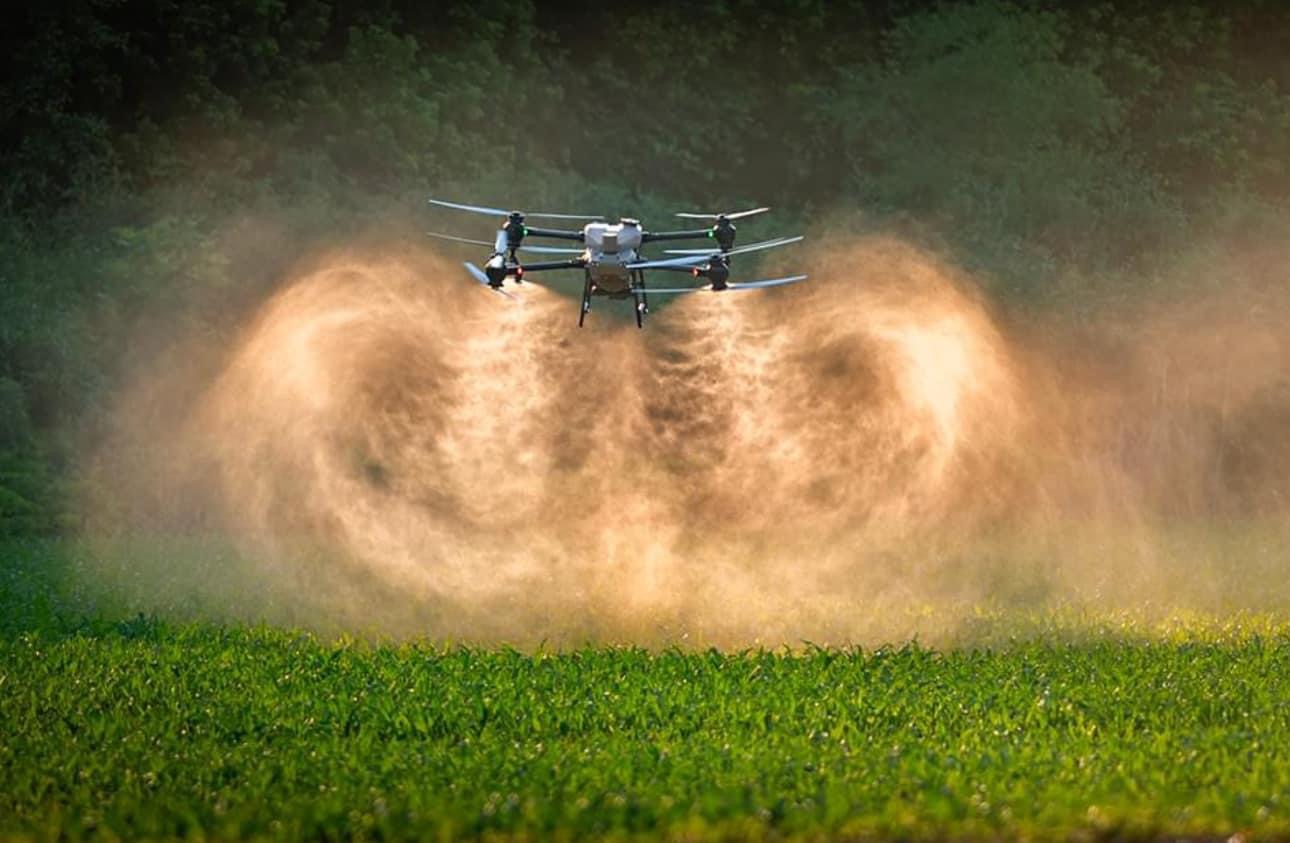Chinese firm DJI Technologies has hit back at “baseless accusations” from US lawmakers about its ag spray drones in a letter sent by 12 Republican members of Congress to USDA Secretary Tom Vilsack and Cybersecurity and Infrastructure Security Agency director Jen Easterly.
The letter was sent as the US House of Representatives voted to pass the Countering CCP Drones Act (HR 2864), which would add equipment and services from DJI—the market leader in ag spraying drones in the US—to something called the ‘covered list.’ This would prevent DJI from getting Federal Communications Commission licenses for future drone models, and potentially lead to the revocation of existing FCC authorizations.
The bill, which has also been added as a rider to a defense spending bill [the National Defense Authorization Act or NDAA] that passed in the House in June, must also pass in the Senate to become law, noted DJI head of global policy Adam Welsh.
“Everything depends on the Senate in both cases, as a standalone bill and as part of NDAA [the Senate version of which does not contain measures vs DJI but will have to be reconciled with the House version].”
“For years, the US government has known that DJI presents unacceptable economic and national security risks but no one was willing to take the necessary steps to remove Communist Chinese spy drones from our skies. That changed today. It is strategically irresponsible to allow Communist China to be our drone factory. It is now critical that the Senate include this legislation in their National Defense Authorization Act.” Congresswoman Elise Stefanik
Lawmakers: ‘Communist China will have control over our nation’s food supply’
In the letter to Vilsack and Easterly signed by lawmakers Elise M. Stefanik, Ashley Hinson, Robert J. Wittman, Mark Alford, Derrick Van Orden, Dan Newhouse, Michael Guest, Neal P. Dunn, Andrew R. Garbarino, Dusty Johnson, Ben Cline, and John R. Moolenaar, the authors highlight the alleged dangers of the “proliferation of Chinese-manufactured agriculture drones throughout the US.”
Thanks to “unfair trade practices and massive government subsidies, the Chinese Communist Party (CCP) is weaponizing its monopoly of the global drone supply to gain leverage over our nation’s food supply,” claims the letter.
“DJI is closely linked to the CCP and is a Chinese military company according to the US Department of Defense. The risk of these DJI agricultural spray drones being manipulated to carry out an attack in the United States cannot be ignored.”
DJI’s line of ag drones can also collect data that can be “weaponized by the CCP to gain access into granular level detail on the stability and condition of the US agriculture sector,” allege the lawmakers.
As a Chinese firm, DJI must also turn over data it collects in China and overseas to the Chinese government, they claim. “Not only can the CCP leverage its access to this data to disrupt our agricultural production, it also has control over the export of Chinese-manufactured drones. If the success of the US agricultural industry is dependent on American farmers’ access to procuring and operating Chinese drones, then Communist China will have control over our nation’s food supply.”
DJI: ‘Under the definition employed by DJI’s critics, virtually any company could be considered subsidized’
In a blog post rebutting the claims, DJI rejected the authors’ assertion that DJI’s US market leadership in ag drones reflected unfair trade practices, adding: “DJI drones remain the product-of-choice across industries because of the combination of reliability, innovation and safety of our products and because of our first mover advantage.”
It added: “Under the definition employed by DJI’s critics, virtually any company could be considered subsidized.”
Meanwhile, accusing DJI of seeking to jeopardize America’s food supply “is not only completely false but also highly contradictory,” added DJI. “DJI’s agriculture drone solutions have proven to support sustainable farming and help farmers incorporate precision agriculture techniques, enabling them to boost yields, lower crop input costs, and avoid expensive yield losses.”
Regarding security, it said: “Since 2017, we have continuously invested in regular security audits performed by reputable third-party experts, while also enhancing the privacy controls available across our drone models. DJI is also aligned with US government and industry guidance for drone operators to practice good security hygiene and to perform regular reviews and training to ensure their protocols remain up to date with industry standards.”
DJI drones “do not collect flight logs, photos, or videos by default. And operators have to opt-in to share this data with us,” explained the firm. As for drones ‘going rogue’ mid-flight, “Those who want to take extra precautions can easily choose to activate Local Data Mode and even switch on their mobile’s ‘airplane mode’ for added peace of mind. This means the flight app is completely disconnected from the internet.”
It added: “DJI has never received any requests for overseas data under China’s National Security Law and National Intelligence Law. If it were to receive such an order, DJI’s policy is to review the request to check if it meets legal requirements for disclosure… this only applies to data DJI does have access to, and as we have said earlier, DJI does not collect flight logs, photos, or videos by default.”
If the signatories of the letter are genuinely interested in supporting US farmers, said DJI, they should engage directly with farmers to see firsthand how they use drones to optimize operations and increase yields and develop technology-based data security standards that all drone operators and manufacturers must follow, regardless of their country of origin.
‘Disheartening’ to see ‘public policy discussions swayed by political considerations rather than facts’
A DJI spokesperson told AgFunderNews: “While it’s disheartening to see public policy discussions once again being swayed by political considerations rather than facts, DJI remains committed to actively engaging with lawmakers to dispel misconceptions about our brand.
“DJI drones are utilized by federal agencies, local law enforcement, and emergency response teams to keep communities safe and save lives. The use of DJI drones has also enabled the growth of small businesses in sectors ranging from real estate to agriculture and transportation. All of these rely on access to DJI drone technology to support their operations.
“Legislation that restricts US drone operators’ ability to purchase and use the right equipment for their work, based solely on the equipment’s country of origin, not only undermines American interests but also harms the very industry Congress intends to support.”
Coalition keen to ‘protect vital data across all drones, regardless of country of origin’
DJI distributors that have spoken to AgFunderNews in recent weeks say fears that ag spray drones could be commandeered mid-flight for nefarious purposes or send vital information back to China are overblown. However, they are keen to address lawmakers’ security concerns and create cybersecurity standards or appropriate regulations to “protect vital data across all drones, regardless of country of origin,” according to Drone Nerds CEO Jeremy Schneiderman.
Bryan Sanders, president at full-service industrial drone company HSE-UAV, added: “It’s hot to be anti-China right now and DJI has kind of become the whipping child in all this, but this technology provides nothing that you can’t gather from other publicly available sources on planting and crop production, and if you want maps, go to Google Earth. If you want to see what pesticides are being used and in what quantities, you can go to the EPA website.”
He added: “What we’re seeing is a lot of fear mongering and scenarios that sound scary. But if you really look at what’s being said, you can quickly debunk it.”
Further reading:





